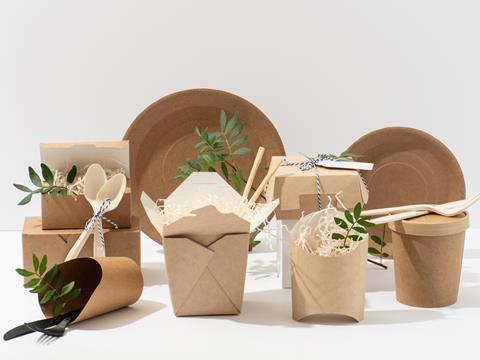
Eco-Products has announced a new product line designed to make differentiation between compostable and non-compostable products easier for consumers, composters, and the foodservice value chain.
Reportedly aligning with new labelling rules in Washington state and Colorado, in the US, the company states all cups, lids, containers and cutlery in the new Veridian line feature the word “compostable”, display the BPI Certification Mark signifying the material is compostable and include green or brown identification elements like tinting and striping, to help distinguish them from their non-compostable counterparts.
The Veridian line contains over 50 items including cold cups and lids, hot cups and lids, clamshells, deli containers, portion cups, salad bowls and cutlery. All the items are designed to meet the new labelling rules that require the use of the word “compostable,” a third-party certification mark, and a combination of colour and design elements that vary by state.
Apparently, the laws were created to address contamination challenges and make compostable foodservice products more readily and easily identifiable. Last year Eco-Products launched the “CIRC” Program (Controls Intended to Remove Contamination) which is an open source, systems approach to contamination mitigation for the foodservice industry.
The company says contamination from non-compostable products continues to be the biggest challenge facing composters accepting compostable products and is significantly impacting the growth of composting infrastructure designed to process food scraps and packaging together. This results in more food being sent to landfills, a well-established driver of climate change.
“Composters have an extremely limited ability to deal with contamination once it gets to their facilities,” Wendell Simonson, director of marketing at Eco-Products, said. “That means we need to do everything possible to keep non-compostable products out of organics streams, and consistent on-item labelling is a foundational piece of that effort.”
In February this year, a consumer behaviour trial run by the Compostable Coalition UK revealed that the number of consumers disposing of their compostable packaging in food waste bins increased five-fold once they were provided with educational material and clear compostability labels. Contamination levels in food and garden waste bins were also said to decrease from an average of 9% to 3% by the end of the testing period.
Last November saw Mondi reveal its entire kraft paper packaging portfolio was certified as home or industrially compostable, in line with falls in line with the Mondi Action Plan 2030, in which 100% of Mondi’s packaging and paper products will become reusable, recyclable, or compostable by 2025. The company clarified that its focus remains on keeping fibres in the loop by ensuring recyclability, but it believes composting can be useful in particular contexts, such as its use in products set to enter the biowaste stream.
If you liked this story, you might also enjoy:
The Brief: How viable is biorecycling for plastics?
Report: How the top brands are progressing on packaging sustainability
The Brief: Using ocean-bound plastic in packaging – how, why and should we?














No comments yet